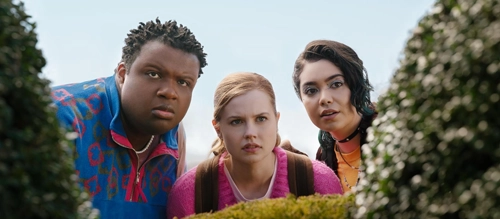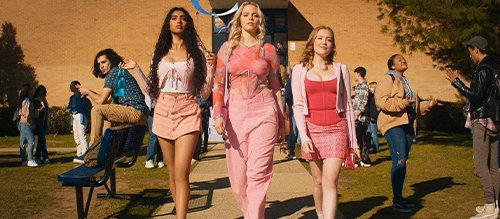Mean Girls (2024) Review

Mean Girls (2024)
Directors: Samantha Jayne, Arturo Perez Jr.
Screenwriter: Tina Fey
Starring: Angourie Rice, Renee Rapp, Auli’i Cravalho, Jaquel Spivey, Avintika, Bebe Wood, Christopher Briney, Jenna Fischer, Busy Phillips, Tina Fey, Tim Meadows
The fundamental problem with Mean Girls, based on the Broadway musical adaptation of the 2004 film starring Lindsay Lohan, reveals itself immediately. When the film opens, we’re looking at Janis (Auli’i Cravalho) and Damian (Jaquel Spivey), through an iphone screen. They’re in a garage and Janis plays guitar as they sing “Cautionary Tale,” a catchy, vibrating pop number explaining that the story we’re going to watch unfold is about “corruption and betrayal and getting hit by a bus.” As in the stage adaptation, Janis and Damian are quasi narrators, taking over the role previously held by our main character, Cady Heron, now played by Angourie Rice. But in changing the lens through which the story is told, Mean Girls loses the personality and point of view that made the original into a classic, a film that is still quoted heavily 20 years later. Without an anchor, the film devolves into a mess of jagged parts that don’t make up a whole, and not even a few infectious songs and strong performances can make up for it.
The plot of the musical film is virtually unchanged from the 2004 original, with a few minor tweaks. Cady Heron is a homeschooled “jungle freak” who trades the grasslands of Kenya for North Shore High School and struggles to fit in. Social outcasts Janis and Damian take her under their wing, introducing her to the various cliques around school. Queen Bee Regina George (Renee Rapp) notices Cady and invites her to join the Plastics, which consists of people pleaser Gretchen Weiners (Bebe Wood) and “the dumbest person you will ever meet” Karen Shetty (Avantika). Janis takes this opportunity for Cady to infiltrate the plastics and ruin Regina’s life, as payback for Regina outing Janis as a lesbian when they were younger.
In the original film, while Cady has friends back in Africa and spends a lot of time with adults, she is confused by the rules of the girl world and the politics of a small town American high school. She expresses her thoughts and feelings in a voiceover, and we see the events of the film play out mostly through her perspective, like how the kids at the mall remind her of animals surrounding a watering hole. Lindsay Lohan makes you feel for her – even when she’s being a bitch – and her narration only adds to that. In this new Mean Girls, however, Angourie Rice plays Cady like she’s an alien pretending to be a human, who has never actually spoken to a human in her entire life. She walks around with a bewildered expression on her face for most of the movie. Her smile never meets her eyes and her singing voice is flat and expressionless. Because the film doesn’t act like Cady is the main character, she gets completely lost and feels like a bystander instead of an active participant. Her descent into mean girl-ness is completely unbelievable, which makes a lot of the emotional beats toward the end of the film feel hollow and unearned.
To be clear, many of the problems in Mean Girls are directly related to its source material. Tina Fey wrote the book for the stage musical as well, and it is very clear that in both instances she just copy and pasted or shuffled things around. Whole scenes and chunks of dialog remain from the original film, while the heart and soul of it seems to have been ripped out. Updating this film for gen-z could have been a great opportunity to explore how much has changed in pop culture since 2004, not just for teenagers but for everyone. How our self-worth is distorted by social media, and how we use social media to bully and demean. Aside from a hollow attempt at incorporating TikTok into the plot, Mean Girls has no idea what’s really going on with teenagers today and it speaks to how obviously out of touch Tina Fey is with this generation. Her script for the original Mean Girls captures something relatable and genuine about growing up in the early 2000s and it’s a shame this film couldn’t adapt.
Along with its heart, Mean Girls has lost its bite too. In the original film, Regina George is terrifying. People don’t just say she’s a bully, she actively bullies. This includes but is not limited to: calling a girl’s mom pretending to be Planned Parenthood, giving back-handed compliments, and manipulating Cady because she is threatened by her. In the musical, people say that Regina is mean, but she doesn’t really do anything to warrant that description. None of the girls do. Renee Rapp is a powerhouse vocalist, but her screen presence alone cannot make up for such a mangled script. The movie also doesn’t seem to know what to do with Regina’s eating disorder, and while a lot of the racist jokes from the original film are thankfully removed, the movie is still incredibly fatphobic. This new film would have been a great opportunity to explore how beauty standards have changed since the early 2000s, but Fey simply doesn’t even try. Even in reprising her role as Ms. Norbury, Fey is giving none of the energy she gave to the original film. Thankfully, Tim Meadows, once again playing Principle Duvall, is still hilarious.
The only characters who almost escape this fate are Janis and Damian. Cravalho and Spivey light up the screen whenever they appear, their vocals blowing nearly everyone else out of the water. They manage to take truly iconic characters and make them their own, and Cravalho’s infectious rendition of “Revenge Party” is almost good enough to make you forget nonsensical lyrics like, “It’s a party where revenge is what it’s like.” But even though Janis is a proudly queer in this version, her sexuality is merely a footnote in the story and is never given much context or depth.

The camera work is unfocused and confusing, with a nauseating amount of close-ups and medium shots that feel edited together in a way that never let you get a sense of space, or where characters are in relation to other characters in the same scene. The blocking, particularly in the scene in which Cady first meets the Plastics, is stiff and awkward, making Mean Girls feel more like a community theater production of the musical rather than a movie made by Paramount for millions of dollars. Speaking of which, it is abundantly clear that this film was originally made to be dumped on Paramount’s streaming channel, Paramount+. Everything feels cheap, from the clothing to the sets to the paper-thin script.
The lighting is especially egregious, particularly in scenes that take place outdoors or in the cafeteria. The lighting is either flat, leaving actor’s faces without any dimension, or downright unflattering, highlighting dark circles and sweat. Most of the film is painted in cold blues and queasy greens, especially in the cafeteria, where the shades are always drawn for some reason (likely because it’s a thinly dressed studio) and it feels like we’re in a submarine. There are moments of color and sunshine, like when they perform “Revenge Party,” and it looks like Limited Too circa 2006 threw up all over the school hallways. But those moments and few and far between and only highlights how uneven the rest of the movie is.
The one thing this film had going for it, the one thing that could have made it stand on its own against the original, is the music. Unfortunately, a good chunk of the songs are cut from the film or shortened. “Meet the Plastics,” the song that is supposed to introduce our three plastics, now only introduces Regina; Karen and Gretchen’s parts are completely cut out. “More is Better,” where Aaron and Cady argue about Cady turning into a clone of Regina, is also cut, robbing our two love interests of having a genuinely emotional moment together. Instead, they spout the same exact dialog from the original film, adding nothing new. And while Christopher Briney, known for his work on Hulu’s ‘The Summer I Turned Pretty,’ is very good at being broody, he seems miscast in this, and because his character’s songs were entirely removed the film he is always on the sidelines, never making much of an impression. It’s bizarre that the film would go to such lengths to chop up all of the songs considering it’s the only thing that could have made this movie worth watching.
Mean Girls (2004) is a teen classic. Although some of it hasn’t aged well, it still captured something real about the time in which it was made. Its exploration of the cruelty teenage girls inflict on each other still rings true today. There are moments when Mean Girls (2024) seems like it might be getting at something real, where it might actually be saying something. There are moments where the performances are just right, when characters seem to click. But those moments are fleeting, and they are gone before you have time to notice. In the end, Mean Girls (2024) is a shadow of its former self, an echo of a much better movie; as brittle and fake as plastic.
Score: 6/24

